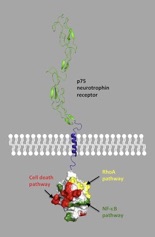REGENERATIVE PHARMACOLOGY LAB




















Regenerative Pharmacology
Aim of our research studies is to explore and reveal the molecular mechanisms that are underlying the regenerative capacity of the Nervous System. We are focusing into the following aspects:
A. Neurotrophin signaling in mature neuronal cells and neural stem cells in the adult brain.
B. Development of novel synthetic analogs as neurotrophin mimetics.
C. Molecular pharmacology of neurotrophin receptors on adult neurogenesis on Alzheimer Disease.
D.Development of 3D scaffolds for ex vivo reconstruction of specific neuronal networks.
E. Studies on the interaction of glucocorticoid rhythmicity with neurotrophins in neurological disorders.
Research interests: Molecular Pharmacology of Neurotrophin Receptors - Adult neurogenesis - Neuronal tissue engineering
We are focusing our research interests on the investigation of the molecular mechanisms that growth factors and their receptors are using to induce neuronal survival, as well as to regulate the regenerative capacity of the adult nervous system. Such molecules, as Neurotrophins, control brain development and maintenance during adulthood and in aging, while they importantly participate in neuronal survival, differentiation and repair. Our studies are ranging from neurotrophin receptors structure-function experiments to development of novel ligands with specific effects on these receptors (mainly the TrkA, TrkB and p75NTR, receptors of the Nerve Growth Factor and Brain Derived Neurotrophic Factor), as well as their interactions with other molecules like glucocorticoids, in order to depict their therapeutic potential on animal models of neurodegenerative diseases (Alzheimer’s Disease and Spinal Cord Injury). The aim of our work is to decipher the multiple signaling effects of these neurotrophin receptors and thus to design and test novel analogs of their ligands with desired pharmacological properties (small size, lipophilicity etc). In order to explore the aforementioned effects of neurotrophins analogs to their receptors we use a plethora of molecular/cellular biology techniques (site-directed mutagenesis, signaling mechanisms studies, cellular assays to measure proliferation, differentiation and apoptosis) in primary neuronal and glial cultures (neurons, oligodendrocytes and Schwann cells isolated from hippocampus, cortex, cerebellum, Superior Cervical Ganglia and Dorsal Root Ganglia) or embryonic (cortical) and adult (SVZ and hippocampal) neural stem cells cultures. Finally, we test our compounds for their efficacy –mediated from the neurotrophin receptors- to promote neuroprotection or neurorepair through their ability to induce adult neurogenesis, in in vivo animal models of neurodegenerative diseases, like Alzheimer’s Disease (using the 5xFAD mice) or Spinal Cord Injury.
In addition, we are interested in developing 3D biomimetic scaffolds in order to culture and study ex vivo neuronal populations and their networking in resemblance to real brain conditions. Using different materials (silicon, collagen scaffolds) we have established 3D neuronal cultures with preferable axonal orientation, in co-culture with glial cells. Moreover, we have specified the biodegratable materials (like collagen) that supports the 3D culture of neuronal precursors and mature neurons and their capacity as neuroimplants in a Spinal Cord Injury mouse model.





